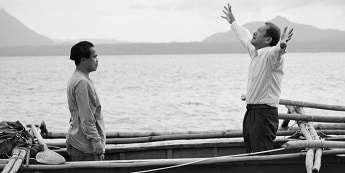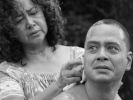Eye For Film >> Movies >> When The Waves Are Gone (2022) Film Review
When The Waves Are Gone
Reviewed by: Jennie Kermode

When President Duterte first began talking about extending police powers and taking his War on Drugs to the streets, horrified onlookers around the world knew what was going to happen but felt powerless to prevent it. In this slowly unfolding Filipino drama (which, at just over three hours, is still fairly short as Lav Diaz films go), the experience of the viewer is similar. Tragedy is signalled at the outset; horror is almost omnipresent; and yet there is still an awful momentum, a grip exerted by the sense that something worse is to come.
At the centre of it are two troubled men: Hermes (John Lloyd Cruz), a police detective, and Macabantay (Ronnie Lazaro), once his superior officer, who has just completed a ten year spell in prison after Hermes helped take him down for corruption. Naturally, the emergence of the latter is not good news for the former, but this is no straightforward good guy vs bad guy scenario, as in Macabantay’s absence, the once clean cut officer, much admired for his insight and his remarkable memory, has become increasingly corrupt himself, psychologically damaged by his participation in Duiterte’s war. Not only his professional behaviour has deteriorated – he’s also in the process of destroying his home life, which is ugly to watch in itself but also leaves him with no local source of support. Perhaps as a result, his health is suffering, a psoriasis-like rash slowly spreading across his skin. He cannot escape from pain.

In a brief scene early on in the film, we see a woman rush to hold an injured man following a police shoot-out. Neighbours stand around, shocked. Everybody is too afraid to intervene once a person has, in effect, been declared an enemy of the state. The woman, heedless, screams out for somebody to call an ambulance. It’s an isolated reminder of how civilised values ought to manifest, and of how far society has fallen.
As Hermes struggles to survive in a downward spiral, Macabantay seeks some kind of redemption or spiritual release. He believes that by baptising people and saving souls he might somehow achieve atonement, but if this notion was ever a product of reason, it soon becomes something else, a compulsion which he must carry out regardless of whether or not the people he’s ‘saving’ have really consented, and regardless of the consequences. In pivotal moments at different points in the film, we see each man dancing by himself, consumed by subconscious urges, expressing himself without thought to who might see him or what they might think. We see their animal selves, in contrast to Macabantay’s pseudo-spiritual speeches and Hermes’ quietly anguished philosophical conversations.
Though the bulk of the film is set in the city, we also spend some time further afield, when Hermes seeks refuge with his older sister, Nerissa (Shamaine Centenera-Buencamino) in San Isidro. Abandoned by other members of the family, and bearing lingering resentment towards him for that, she lives alone, tending her vegetable garden, and seems to represent a more peaceful past. She takes Hermes to visit the places where they spent their childhood, now slowly being washed away by the sea. Here, too, is that sense of inescapable destruction. Photographed by Larry Manda in cool black and white, the landscape retains a sullen beauty. Trees and other plants will hold on for as long as they can, until the waves take them.
When death comes for Hermes and Macabantay, will anyone notice? The real horror of Diaz’s film lies in its recognition of how meaningless all these conflicts are. In the opening sequence, we see Hermes teaching a class about the art of solving cold cases. He recalls how a chance encounter brought resolution to a mystery which had puzzled officers for years. Throughout the film, there is a strong sense of the influence of accidents on human fate. A crushing sense of responsibility is everywhere, and yet there seems to be very little real control. Something has been unleashed against which the individual will strains to little effect. The waves role in relentlessly, erasing the patterns on the shore.
Reviewed on: 02 Mar 2023
















